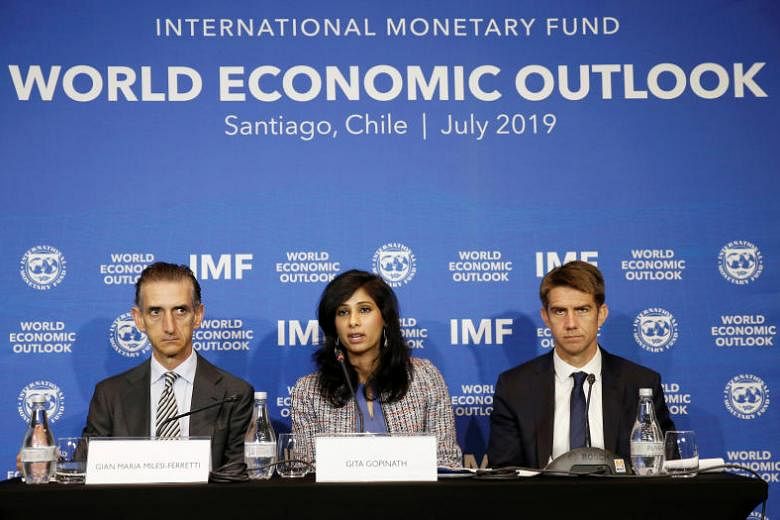WASHINGTON • The International Monetary Fund (IMF) has further reduced its global growth outlook - already the lowest since the financial crisis - and suggested that policy "missteps" on trade and Brexit could derail a projected rebound.
The world economy will expand 3.2 per cent this year and 3.5 per cent next year, both down 0.1 percentage point from April projections, the IMF said in its latest quarterly World Economic Outlook released yesterday in Washington.
A rate of 3.3 per cent or lower would be the weakest since 2009. The IMF also slashed expectations for growth in the global volumes of trade in goods and services, cutting its estimate by 0.9 point to 2.5 per cent for this year.
"The projected growth pick-up in 2020 is precarious, presuming stabilisation in currently stressed emerging-market and developing economies and progress towards resolving trade policy differences," it said.
The IMF warnings follow weaker readings on China's growth. The US Federal Reserve is poised to cut interest rates at the end of this month for the first time in more than a decade.
But the IMF predicted a rebound to 3.7 per cent growth in volumes next year.
"The principal risk factor to the global economy is that adverse developments - including further US-China tariffs, US auto tariffs, or a no-deal Brexit - sap confidence, weaken investment, dislocate global supply chains, and severely slow global growth below the baseline," it added.
IMF chief economist Gita Gopinath told reporters in Santiago, Chile, the global lender did not see signs of a recession, but did see "significant downside risks" for global growth going forward, including escalating trade wars.
Gian Maria Milesi-Ferretti, deputy director of the IMF's research department, told Reuters in an interview sluggish trade was due to several factors, including uncertainty caused by the US-China trade war, weaker investment and cyclical weakness in the automotive and technology sectors.
"The end of 2018 was quite weak," Mr Milesi-Ferretti said. "You have a combination of factors at play here, some of which are of a temporary nature and some of which may be a sign of a more significant slowdown."
Mr Milesi-Ferretti said trade was mainly driven by investment goods, and investment activity had been weak in Latin America, Europe and, importantly, China, which was facing a sizeable slowdown in domestic demand.
"When investment slows in China it shows on the global radar screen," he said.
Global trade had also been hit by a down cycle in trade in goods and components associated with the production of tech products such as iPhones and other electronics.
"That cycle had provided a big boost to global trade in late 2017, but it has turned and it has been quite weak recently and that shows in the trade numbers, particularly in Asia," Mr Milesi-Ferretti said.

Reduced demand for cars and disruptions to car production in Germany were another factor behind sluggish trade, he added.
"When you have an increase in uncertainty ... the first thing that consumers do is cut purchases of durables and wait for the situation to clarify," Mr Milesi-Ferretti said.
He said tariffs imposed by the United States and China also affected investment plans, further dampening the outlook.
US President Donald Trump has threatened to impose tariffs on the remaining US$300 billion of Chinese imports still free of them, and to raise tariffs on European and Japanese auto imports to 25 per cent. The moves have triggered retaliatory measures.
Concerns about the tariffs means "firms may think twice before setting up production facilities overseas, before expanding production, because they want to know what the global environment is going to look like," Mr Milesi-Ferretti said.
He said it was unclear how quickly economies would recover once tariffs were lifted because it would depend on whether people felt a more durable resolution had been found.
The IMF economist also cited growing anecdotal evidence about a structural shift in global supply chains triggered by the current trade tensions around the globe.
"These are not things that happen overnight. You don't change the structure of your supply chain overnight," he said. "But this is something that may well happen."
He said spreading production globally had helped boost efficiency and productivity, but the current situation also revealed that such systems were vulnerable.

